| dc.contributor.advisor | Barry, Nancy, | en_US |
| dc.contributor.author | Raiber, Michael Allen. | en_US |
| dc.date.accessioned | 2013-08-16T12:18:07Z | |
| dc.date.available | 2013-08-16T12:18:07Z | |
| dc.date.issued | 2001 | en_US |
| dc.identifier.uri | https://hdl.handle.net/11244/276 | |
| dc.description.abstract | As many music teacher education programs cite reflective frameworks as the foundation of their instructional program, these findings may be cause for some modification. It appears that knowledge of students' reflective aptitude is important at initial stages of music teacher education. Additionally, changing school environments such that they are more conducive to reflective teaching, may allow more experienced music teachers to continue to use their reflective abilities to modify instruction. Finally, it appears that aiding pre-service music teachers' role development so that they take ownership of a classroom may be a key to effective music teacher education. | en_US |
| dc.description.abstract | The purpose of this study was to determine the extent to which selected instrumental music teachers' aptitude for reflection and/or self-reported engagement in reflective practice could predict their instructional effectiveness. Subjects were fifty instrumental music teachers with one-half year to twenty-eight years experience. Their instructional experience ranged from beginning instrumental classes to collegiate ensemble conducting. Two survey instruments were used to measure subject's reflective aptitude and engagement in reflective practice. Instructional effectiveness scores were determined via an evaluation of ten-minute teaching tapes submitted by each subject. A team of three adjudicators reviewed the tapes and calculated scores using the Survey of Teaching Effectiveness (Hamann & Baker, 1996). | en_US |
| dc.description.abstract | Results from multiple regression analysis show that reflective aptitude combined with teaching experience is significantly predictive of music teaching effectiveness, but in very different ways. Novice teachers with higher reflective aptitudes were found to be more effective teachers. Conversely, career teachers with lower reflective aptitudes were found to be more effective teachers. A teacher's belief concerning his/her direct effect on the teaching and learning in the classroom was found to be predictive of music teaching effectiveness across all experience levels. | en_US |
| dc.format.extent | xi, 202 leaves : | en_US |
| dc.subject | Education, Music. | en_US |
| dc.subject | Music Instruction and study. | en_US |
| dc.subject | Music in education. | en_US |
| dc.title | An investigation of the relationship between teachers' engagement in reflective practice and music teaching effectiveness. | en_US |
| dc.type | Thesis | en_US |
| dc.thesis.degree | Ph.D. | en_US |
| dc.thesis.degreeDiscipline | School of Music | en_US |
| dc.note | Adviser: Nancy Barry. | en_US |
| dc.note | Source: Dissertation Abstracts International, Volume: 62-02, Section: A, page: 0505. | en_US |
| ou.identifier | (UMI)AAI3004869 | en_US |
| ou.group | Weitzenhoffer Family College of Fine Arts::School of Music | |
